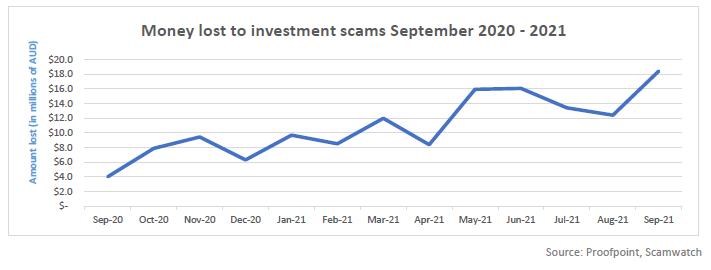
Australians lost more than $30 million to scams in September, according to the latest figures from the Australian Competition & Consumer Commission’s (ACCC) Scamwatch. This figure represents an increase of 13% compared to August and almost double the amount recorded in September 2020. This brings the total amount lost to scams so far this year to more than $222 million. Over 34,100 scams were reported in September, a decrease from August, while 101,800 scams were reported across the third quarter, a 66% increase on Q2 2021.
 Investment And Job Scams See the Highest Losses on Record
Investment And Job Scams See the Highest Losses on Record
Australians lost more than $18.4 million to investment scams in September, the highest total monthly loss on Scamwatch’s record for this category and a significant 360% jump compared to September 2020. Middle-aged Australians accounted for 40% of the money lost to investment scams, while Australians aged 25 to 34 showed the highest number of reports for these scams.
The amount lost to scams relating to jobs and employment also rose significantly to more than $707,000, another record for the highest total amount lost since Scamwatch started publishing reports in 2018. Young Australians aged 18 to 24 were disproportionately impacted by these scams, making up nearly three-quarters of the total amount lost.
Dating and romance scams were the second most profitable type of scam in September, with Australians losing nearly $5 million. The number of these scams reported increased by 13% compared to August and had one of the highest incidents of financial loss, with 46% of all reports resulting in money lost. The amount lost to classified scams which typically see scammers posing as genuine sellers and buyers, increased by nearly 20% from August, with losses surpassing $816,000.
Phishing scams remained the most common type of scam reported, followed by threats to life or arrest and online shopping scams, which increased by 22% during the month. Despite Australians over 65 reporting the highest number of identity theft scams – the fourth most common scam type in September, Australians aged 24 to 34 were most impacted in terms of money lost. Health and medical product scams also nearly doubled during the month.

Locked-Down and Older Australians Most Impacted
Australians in states with stricter COVID-19 restrictions were the most impacted by scams during September. NSW residents accounted for the highest amount of money lost at $11.1 million, while the amount lost by Victorians increased by more than 50% to nearly $10 million and by 37% for residents in the ACT.
Australians aged 45 to 54 were the hardest hit financially during the month, accounting for 32% of the total money lost in September, more than double the amount recorded in August. Scammers targeted older Australians the most with those aged 65 and over reporting the highest number of scams at 5,642. Australians 65 and over were most financially impacted by remote access scams and hacking scams as an age group. In contrast, younger Australians aged 24 to 35 suffered the highest losses from false billing, identity theft and ransomware and malware scams.
Delivery Method
Phone calls continue to be the most common and most profitable delivery method used by scammers, costing Australians $7.8 million in September, up 30% from the previous month. The amount lost to mobile app scams also increased substantially in September, more than doubling from $3.8 million lost in August to $6.5 million and was also the highest amount for this method on Scamwatch’s record. Scams with the highest losses delivered via mobile apps included dating and romance, identity theft and investment scams. Text messages scams had the second-highest number of reports in September, likely due to the ongoing circulation of Flubot malware scams, and were up more than 300% compared to the same time last year.

Proofpoint ANZ area vice-president Crispin Kerr, commented:
“September was another record month for scam activity as Australians lost more than $30 million to scams, pushing the total amount lost so far this year to over $220 million, according to the ACCC’s Scamwatch. While it was good to see a slight decline in the number of scams reported during the month, September revealed several concerning trends with significant losses to investment scams for middle aged Australians, the rising incidents of job and employment scams targeting young people and the increase in the amount of money lost to classified scams.
Investment scams have been the single biggest source of money loss throughout the year but peaked in September with losses totalling more than $18 million. Compared to September last year where losses to these scams amounted to $6 million, the most recent figures paint a stark picture of the current reality. The latest data from the ACCC shows it is middle aged Australians who are suffering from these scams the most, with those in the 45 to 54 age group making up 40% of the $18 million figure. Investment scams can be particularly alluring as they promise money or some form of financial compensation. As the pandemic continues to impact many Australians particularly in Victoria and New South Wales, where losses to these scams were the highest, exercising caution and common sense are important to ensuring financial safety.

Scammers have also been taking advantage of the current job market by offering fake job and employment opportunities, commonly delivered via mobile apps and text messages. These types of scams rose sharply in September and unfortunately younger people are suffering the most, accounting for nearly three-quarters of the more than $707,000 lost. In the current climate, and with restrictions easing in some states, it is understandable why these scams are appealing, but we urge people to be cautious. These scams usually come out of the blue and sound too good to be true, which are two of the biggest red flags that something isn’t quite right.
The rise of classified scams was another concerning trend in September, with the amount lost to these scams increasing by nearly 20%. Australians should always be extremely cautious when buying or selling to someone they don’t know. There are a number of warning signs people can look out for when using classified websites or other channels where goods are exchanged. These include people offering very low prices for the items compared to other sellers, refusing to let you view the item before purchasing or asking for international money transfer for payment.
Australians of all ages can and are being targeted by scammers with a variety of cheap, but effective tactics. As scam activity continues to increase, it’s important Australians are taking steps to protect themselves and their families. If you think you’ve been contacted by a scammer, the best thing you can do is to delete, block and report to relevant bodies like the ACCC or an organisation if you think a scammer may be impersonating a company.”





